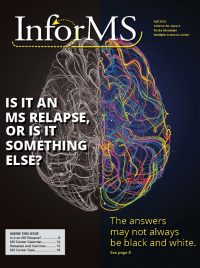Vaccines have been a hot topic since the beginning of the pandemic, and with recent approvals of new COVID-19 boosters, questions continue regarding vaccines among MS patients.
Can vaccines, whether they’re for COVID or one of the many others in common use, cause MS to get worse?
The short answer? No. Vaccines — COVID or otherwise — aren’t likely to be a triggering factor in a true MS relapse.
Can a vaccine trigger symptoms that look and feel a lot like what you may have experienced during an MS relapse before? The answer to that question is yes, it’s a possibility, and it’s complicated.
Many common vaccines leave us feeling a little under the weather for a day or two after receiving a dose. Usually, this means our body is responding exactly the way we want it to — beginning to mount an immune response to whatever it is that particular vaccine is targeting.
Typically these post-vaccine symptoms remain minor, and in the grand scheme of things, we’re better off with a short bout of discomfort if the result is greater protection against a more serious illness.
Occasionally, however, these symptoms themselves can aggravate areas of the brain that have previously been damaged by MS, resulting in what we know to be a pseudo-relapse.
How MS Reacts to Vaccines
There are a number of things that happen in the body when you get a vaccination, and particularly the very effective vaccinations like those available for COVID-19.
The normal and expected inflammation that is part of the response to the vaccine actually release factors that causes body temperature to go up. It may not be a fever (100.4), but a simple rise to 99 or 99.5 is enough to cause MS symptoms to worsen.
Some proteins that are released into the blood stream as part of this inflammation are cytokines and chemokines. These are signaling molecules produced by immune cells that help ramp up (or slow down) inflammatory responses. They may cause other cells to react and produce other molecules in the body that are mainly focused on defense of the individual by trying to limit the infection, which may also impact symptoms.
These are general signs of inflammation, however, what we do not see with vaccines is activation of new MS immune attacks on the brain. For example, there should not be new MRI lesions related to vaccination in the vast majority of individuals. It’s not causing new damage, rather it’s causing a pseudo-relapse due to these biochemical changes in the brain and changes in body temperature. As a result, MS symptom increases after COVID vaccination tend to be brief, often lasting less than 24 hours, but they can last longer. For the vast majority of MS patients, they will resolve over time, and people will return back to their baseline function.
That said, MS relapses can occur at any time, and it is theoretically possible to occur coincidentally with vaccination. Studies have simply shown, however, that there is no increased risk of MS relapse at the time of COVID vaccination. After vaccination with COVID or other vaccines, rare individuals without MS have developed more specific signs of inflammation in the nervous system that may be similar to a MS attack, such as transverse myelitis, or focal inflammation of the spinal cord.
Managing MS When Getting a Vaccine
To manage pseudo-relapses that may be triggered by a vaccine, we treat the symptoms we expect to see with many common vaccines — slight fever, soreness, headache, and general aches and pains.
Taking acetaminophen or ibuprofen as directed, and staying well hydrated can help you manage the side effects of vaccines, including the COVID-19 vaccine and its booster doses.
Managing those side effects of the vaccination may help you have fewer symptoms, feel better, and recover more rapidly from the vaccines.
For more information on this topic, please see the webinar titled “Effects of COVID-19 Vaccine on MS Symptoms: Pseudo-relapses” with Dr. Timothy Vollmer, available at MSCenter.org/webinars and on our YouTube channel.






